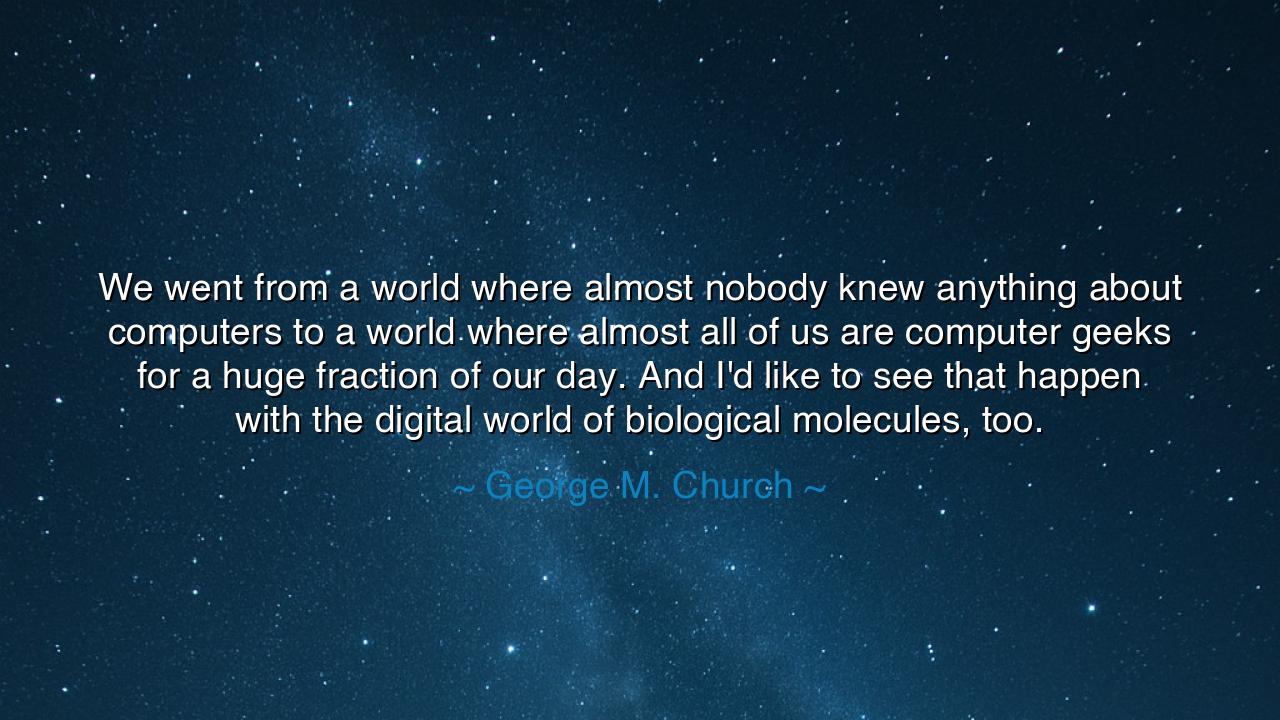
We went from a world where almost nobody knew anything about
We went from a world where almost nobody knew anything about computers to a world where almost all of us are computer geeks for a huge fraction of our day. And I'd like to see that happen with the digital world of biological molecules, too.






"We went from a world where almost nobody knew anything about computers to a world where almost all of us are computer geeks for a huge fraction of our day. And I'd like to see that happen with the digital world of biological molecules, too." These words, spoken by the visionary scientist George M. Church, serve as a profound meditation on the way technology transforms our lives—an echo of the great revolutions of knowledge that have defined the course of human history. Church’s observation is a call to arms, a reminder that the vast potential of human ingenuity has yet to reach its full power. In this reflection, he speaks not only of computers and biology, but of the very essence of progress, how it shapes the world, and how it can propel us into new realms of understanding and mastery.
In ancient times, before the fires of industry and the illumination of knowledge through written word, mankind lived close to the land, relying on nature’s rhythms to guide their survival. They were bound to their environment, dependent upon their ability to read the earth and understand the winds and the seasons. But then, the great philosophers arose, lifting humanity’s gaze beyond the horizon. From Pythagoras to Aristotle, from Galileo to Newton, humans began to peer into the hidden fabric of the universe. The world once defined by observation and instinct was now a world of mathematics and reason. Yet even these great minds, in their wisdom, could not have foreseen the magnitude of the revolutions that would come in their wake.
Then came the computing age. With the advent of the computer, the world saw a rapid transformation. In Church’s words, we went from a world where the machine was a distant marvel, a thing for scholars and engineers, to a world where it became a constant companion, embedded in our daily lives. Once, only a handful of scholars could read the arcane language of computers—but today, even the youngest among us, in our homes and workplaces, wield these digital tools with ease, often without thought or question. The machine has become a part of the very fabric of existence, as familiar to us as the air we breathe. And in this profound shift, we have seen the growth of a new kind of knowledge—a digital culture—one that governs much of what we do, from the simplest tasks to the most complex endeavors.
But Church’s vision transcends the digital revolution alone. He sees the same potential in the biological world, where molecules are the fundamental building blocks of life. Just as we have learned to master the language of computers, so too can we learn to speak the language of life itself. Through the advancements in fields like genomics and synthetic biology, we have begun to decode the intricate patterns of DNA, uncovering the blueprints of life that have been hidden from us for millennia. And yet, as Church points out, while many are still hesitant or uncertain in their understanding of biological molecules, the power to understand, to manipulate, and to harness them for the betterment of humanity is within our grasp.
Take, for instance, the story of CRISPR, the gene-editing tool that has revolutionized the way we approach genetic modification. When it was first discovered, it seemed like a marvel from a distant future, a thing of science fiction. Yet now, just as the computer has become ubiquitous in our lives, so too is CRISPR becoming a fundamental tool in medicine and biotechnology. Scientists have already begun to use it to cure diseases, to modify crops, and to explore the very essence of life itself. In this, we see a glimpse of the future Church envisions—one in which biological molecules are no longer the exclusive domain of specialists, but a realm that all of us can understand, manipulate, and use to shape the future.
The lesson here is one of potential, of the boundless power of human curiosity and imagination. Just as the age of computers was born from the efforts of those who dared to dream of a world interconnected by invisible lines of information, so too can the age of biotechnology unfold before us. The key, as Church so wisely notes, is education—the democratization of knowledge. For it is through understanding that we empower ourselves. The digital world of biological molecules, once an obscure and esoteric field, can become as familiar to us as the desktop on our computers, as ingrained in our lives as the devices in our pockets.
Thus, let us follow the path of progress. Let us not fear the unknown but embrace it, for it is through our knowledge that we shall rise. In our hands, we hold the keys to unlocking the mysteries of life itself. As we have transformed our world through the mastery of machines, so too can we transform it through the mastery of life’s most fundamental elements. The future is not an inheritance to be feared but a challenge to be met. It calls to us to learn, to innovate, and to build a world where the wonders of biology are as accessible and empowering as the tools we now use to shape the digital world. Let us answer that call. Let us learn the language of life and let it guide us to new heights.






AAdministratorAdministrator
Welcome, honored guests. Please leave a comment, we will respond soon